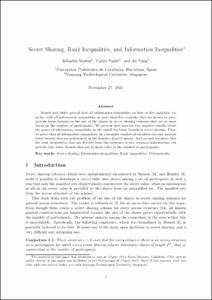Mostra el registre d'ítem simple
Secret sharing, rank inequalities, and information inequalities
| dc.contributor.author | Martín Mollevi, Sebastià |
| dc.contributor.author | Padró Laimon, Carles |
| dc.contributor.author | Yang, An |
| dc.contributor.other | Universitat Politècnica de Catalunya. Departament de Matemàtiques |
| dc.date.accessioned | 2016-04-21T11:07:34Z |
| dc.date.available | 2016-04-21T11:07:34Z |
| dc.date.issued | 2016-01 |
| dc.identifier.citation | Martin, S., Padro, C., Yang, A. Secret sharing, rank inequalities, and information inequalities. "IEEE transactions on information theory", Gener 2016, vol. 62, núm. 1, p. 599-609. |
| dc.identifier.issn | 0018-9448 |
| dc.identifier.uri | http://hdl.handle.net/2117/86051 |
| dc.description | © 2016 IEEE. Personal use of this material is permitted. Permission from IEEE must be obtained for all other uses, in any current or future media, including reprinting/republishing this material for advertising or promotional purposes, creating new collective works, for resale or redistribution to servers or lists, or reuse of any copyrighted component of this work in other works. |
| dc.description.abstract | Beimel and Orlov proved that all information inequalities on four or five variables, together with all information inequalities on more than five variables that are known to date, provide lower bounds on the size of the shares in secret sharing schemes that are at most linear on the number of participants. We present here another two negative results about the power of information inequalities in the search for lower bounds in secret sharing. First, we prove that all information inequalities on a bounded number of variables can only provide lower bounds that are polynomial on the number of participants. Second, we prove that the rank inequalities that are derived from the existence of two common informations can provide only lower bounds that are at most cubic in the number of participants. |
| dc.format.extent | 11 p. |
| dc.language.iso | eng |
| dc.rights.uri | http://creativecommons.org/licenses/by-nc-nd/3.0/es/ |
| dc.subject | Àrees temàtiques de la UPC::Enginyeria de la telecomunicació |
| dc.subject.lcsh | Information theory |
| dc.subject.other | cryptography |
| dc.subject.other | secret sharing |
| dc.subject.other | rank inequalities |
| dc.subject.other | information inequalities |
| dc.subject.other | polymatroids |
| dc.title | Secret sharing, rank inequalities, and information inequalities |
| dc.type | Article |
| dc.subject.lemac | Matemàtica aplicada |
| dc.contributor.group | Universitat Politècnica de Catalunya. MAK - Matemàtica Aplicada a la Criptografia |
| dc.relation.publisherversion | http://ieeexplore.ieee.org/xpl/RecentIssue.jsp?reload=true&punumber=18 |
| dc.rights.access | Open Access |
| local.identifier.drac | 17701018 |
| dc.description.version | Postprint (author's final draft) |
| local.citation.author | Martin, S.; Padro, C.; Yang, A. |
| local.citation.publicationName | IEEE transactions on information theory |
| local.citation.volume | 62 |
| local.citation.number | 1 |
| local.citation.startingPage | 599 |
| local.citation.endingPage | 609 |
Fitxers d'aquest items
Aquest ítem apareix a les col·leccions següents
-
Articles de revista [48]
-
Articles de revista [3.268]


